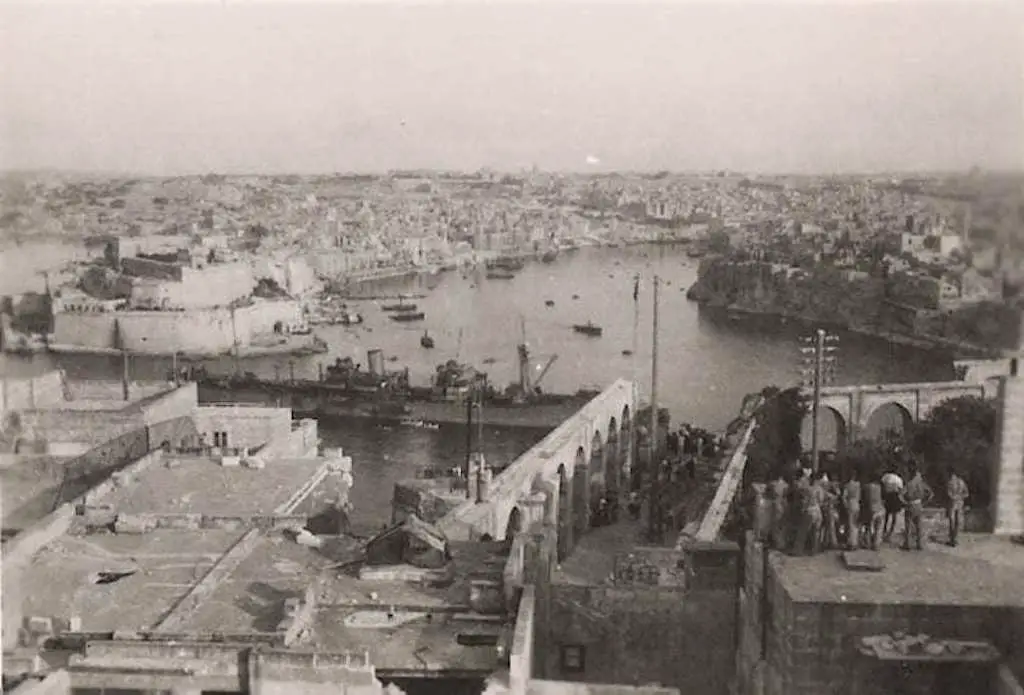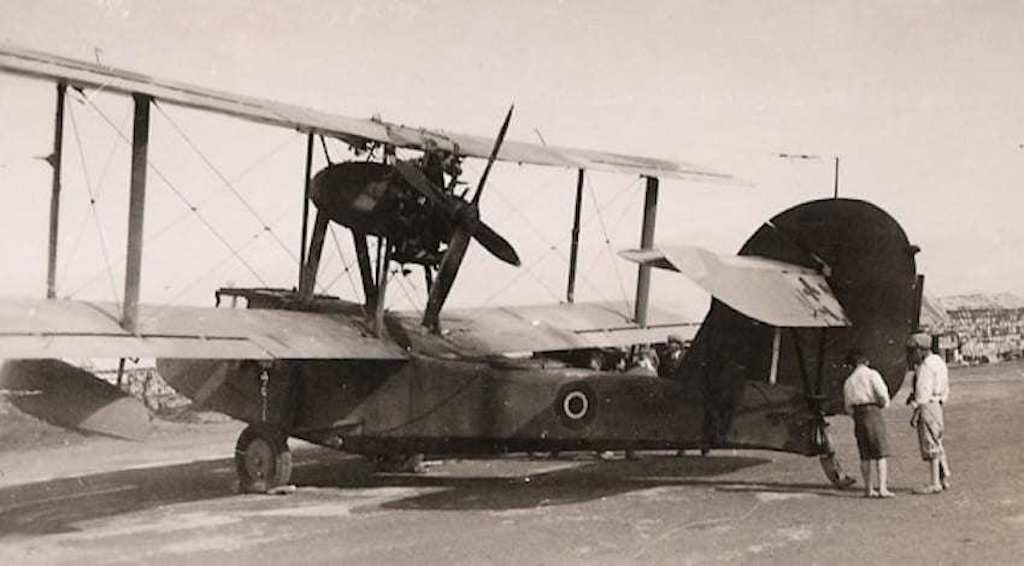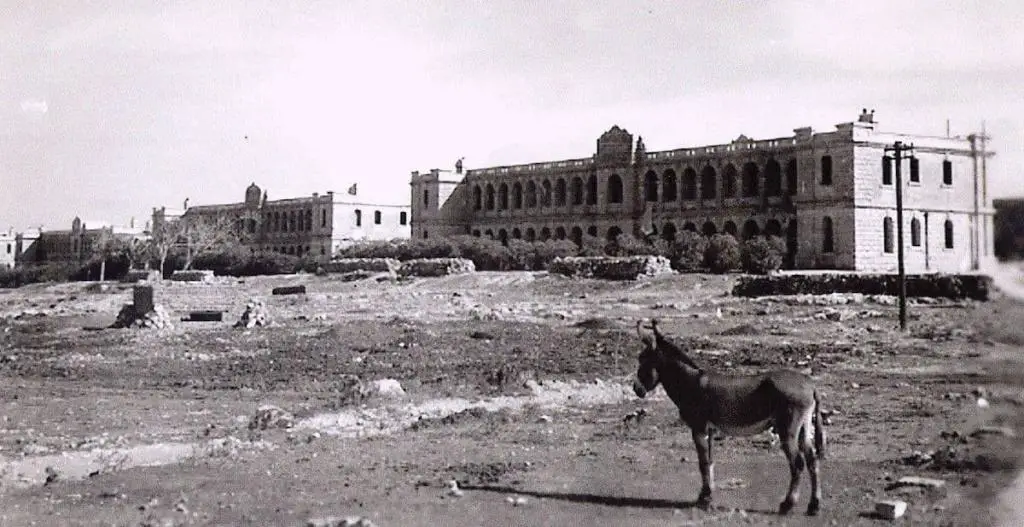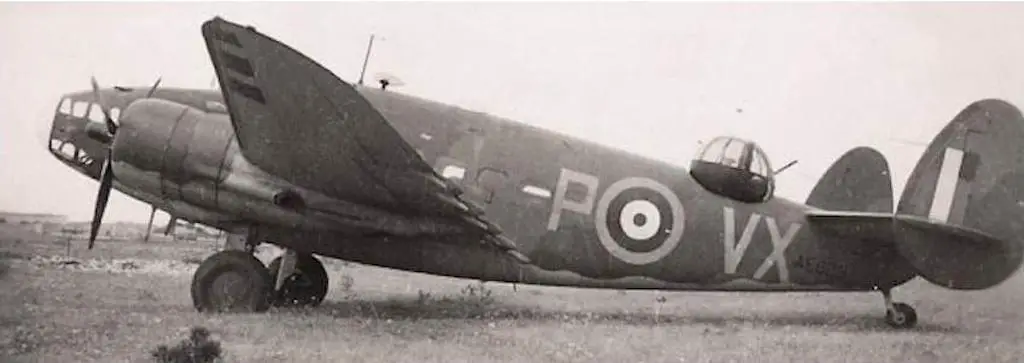Removing Malta from the Equation
When General Albert Kesselring took over command of German forces in Southern Europe late 1941, his main target was to have the island base of Malta put out of use to the British. During the following period, until the start of the Battle of El Alamein in the Fall of 1942, this was always foremost in his head. He had good reasons for it.

A merchant freighter entering Grand Harbour, Malta.
Strategic Importance of Malta
From the start, Malta was only one of many pieces in an extensive set of bases and staging posts to ensure the upholding of the British Empire with its stretched-out communications and trading lines. This was primarily for the benefit of the central financial institutions in London and the supply of raw materials from the Colonies to the United Kingdom’s production facilities and consumers. It also benefited UK-manufactured products and coal going in the opposite direction. These bases, built up through centuries, were originally established for the Royal Navy and the British merchant fleet but, as WW2 approached, they were also to be used for civilian and military air operations. It was a clever and extremely developed system.
Malta’s importance for the Empire increased significantly when the Suez Canal was opened in 1869 as this shortened the transport distances between England and her Colonies in India, Australia, and the Far East. Egypt was consequently targeted by the Empire as another necessary base. In 1882 Britain took control to “protect their investments” in connection with the building of the Canal.
Clever British Strategy
In 1935, at the time of the second Italian invasion of Ethiopia, the Empire, therefore, had a line of mixed civilian and military bases all the way from England to India, Australia, and Hong Kong; Gibraltar, Malta, Egypt, Aden, British Somalia and Singapore and India itself. On the southerly route, down the Atlantic, the British could support themselves on Ascension, Elba, Freetown, the Falklands and the colonies in South and East Africa. The British strategy, to get a foothold in these places, was not one of occupation as such, but rather a mix of protection and occupation. In principle, not unlike what we today call Mafia methods – let us do our thing and we shall protect you. It was a system of common benefits, but you need to pay for it. The British were certainly not alone in using these methods, they were just better than the other colonial powers at managing it.
I like to read books published before the war. Firstly, I find It interesting to compare information and opinions as expressed at the time, with what happened afterward. Secondly, these opinions are not twisted or adjusted as often happens after any war. As we know, history is written by the victors. Austen Chamberlain is known to have said: “All our major wars have been fought to deny any great military power to achieve superiority in Europe so that he cannot control the Channel and the Dutch ports”. Trevelyan put it like this: “From the time of the Tudors, England has used European politics simply as a means to protect itself from invasion and to forward its own proceedings on the Continent”. They were not alone in this line of thinking.
In modern times (up till WW2) it can be seen, true to this policy, how England has been likely to support Germany when France was stronger than Germany, and the other way around. After the First World War, the League of Nations was an admirable tool for such politics. If the League went against the interests of Great Britain they would just ignore it. After the First World War, they cleverly had their dominions, including India, acknowledged as separate members which they could normally control and thereby steer the League’s actions. A similar move was denied for the Soviets in the UN after the Second World War. As the sanction crisis in connection with the Italian invasion of Ethiopia developed, Walter Duranty wrote that “England was not as keen on a war that they were not willing to fight to avoid it”.
Italian Dependence on the Suez Canal
Italy had a much slower start as colonialists go and followed a somewhat different policy, more like that of the German. Theirs was more along the line of real colonization, in the sense that they wanted to draw farmers, investors and specialists of all kinds to their colonies to develop the infrastructure. At the beginning of the 20th century, Italy had also become dependent on the Suez Canal. They had colonies in the North-Eastern corner of Africa (the Horn of African) – Italian Somaliland and Eritrea, which were interspersed between the British and French colonies. Their supply lines passed through the Canal and the Red Sea, which were controlled by the British. At the time, the great colonial powers were as sympathetic to each other as thieves in a market. As a reward for their taking side with the Allies during the great conflict, Italy’s position in the area at the end of WWI actually improved. But, their dependence on the Suez Canal only increased with time.

There were no fighter units on Malta before the war. Here is a Walrus scout seaplane.
Italian Colonialism
At the beginning of the last century, there were great upheavals in the Balkans, a natural Italian sphere of interest, as the Ottoman Empire was breaking up. For Italy, this coincided with a thrust across the Mediterranean to acquire the Ottoman holdings in North Africa, Tripolitania, and Cyrenaica, what is today known as Libya. When the Second Balkan War ended in 1913 Italy had a firm foothold in its new colony of Libya. Italy had even ended up with 12 nice, little, strategically placed islands in the Aegean Sea – the Dodecanese Islands, situated close to the Turkish coast. Its main island was Rhodes. On the other side of the Otranto Straits, Albania has proclaimed an independent state. Situated at the approaches to the Adriatic Sea this area had strategic importance for Italy.
For some years the Italian colonial policy slumbered on. Minor insurrections were coming and going throughout the African Horn. There was constant fighting in Libya against the inland-based insurgents. Then Mussolini came to power and new energy was injected into the building up of the colonies. With the military base expanded, Libya was “stabilized” by Rodolfo Graziani and his forces, and the Dodecanese Islands were permanently included in the new Italy. Mussolini saw this as the start of a new Roman Empire and appropriately the Mediterranean should be his – his “Mare Nostrum”.
The Bitter Defeat at Adua
If Mussolini had kept a cool head all could have ended well for Italy but that was not to be. The history and current status of Ethiopia, also known as Abyssinia, was something that Mussolini just couldn’t live with. In 1896, in an effort to expand their Eritrean colony, the Italians had taken up arms against the newly-established Emperor of Ethiopia, Menelik. Menelik had had several years to build up his army and was assisted by Russian weapons, advisers and specialists. In a final battle at Adua Menelik followed the Russian advice – do not get bogged down in intricate maneuvers – go straight at them. After causing terrible losses, the hugely outnumbered Italian army was soundly beaten. In the wake of this defeat, a detailed agreement was signed which defined the territorial boundaries and would hopefully avoid future misunderstandings.
Revenge and the Creation of Africa Orientale Italiana
This was not enough for Mussolini, he wanted Ethiopia. After a period of minor border incidents and an intensive military build-up, on 3 October 1935, the Italian army in Eritrea crossed into Ethiopia. The combined Italian forces consisted of around 1 million men. Many from different local tribes, armed with an unprecedented number of guns, tanks, aircraft, and modern equipment. To cut a long story short, by May the Ethiopian army was beaten and its leader Haile Selassie had fled to England with the national gold reserve. Then on 1 June 1936 Ethiopia, Eritrea and Italian Somaliland were merged to form the new Africa Orientale Italiana (Italian East Africa).

Military barracks on Malta.
Weak Sanctions Lifted
Of course, the Italians understood the increased importance of the Suez Canal for their East African Empire. This was one of the reasons why so much was invested in the development of long-range flying. This was also an area where the Italians were among the most prominent pioneers in the world. The conquest of Ethiopia did not make it easier to reach the AOI by air but it increased the need for supplies. The Ethiopian affair clearly shows the degree of political horseplay at the time. At first, Italy was condemned by the League of Nations, sanctions were imposed, and finally, Italy withdrew from the institution. Albania followed suit. Throughout this process, however, England and France, supported Italy hoping to keep the Italians away from Hitler’s influences. Japan endorsed Italy’s behavior in return for Italy’s recognition of Japan’s occupation of Manchuria. Soon all sanctions were lifted and Churchill declared the turn of events: A complete triumph for Mussolini.
Continued Expansion
One cannot but wonder how things might have turned out for Italy had Mussolini played his cards better. That is, not joined in with Hitler. What more did he expect to achieve by trailing after the German dictator? Surely, he had his eyes set on Tunisia and the Balkans – a new Roman Empire. Tunisia was a French colony but after the Armistice in 1940, Hitler kept Mussolini on a leash by letting the signing of the peace agreement with France drag on into the future. There was another thorn in Mussolini’s flesh – Corsica. This island was nearer to Italy than France and had a dominating position, not far from the Italian coast, astride the communications between the Italian naval bases in Southern and Northern Italy, and not far from Rome itself. On the other hand, with Italian control over Corsica, the French communication lines between France and North Africa could be threatened. France was keen on acquiring the Balearic islands and they had actually put in an offer to purchase the whole island group from Spain to better protect their communications to North Africa.
Interestingly a secret agreement had been signed between Primo de Rivera and Mussolini in 1923 stipulating that in case of war Italy would be permitted to occupy the Balearics. Not surprisingly, the British did not object to this as it kept up the strain between France and Italy.
As for the Balkans, Mussolini was well on his way towards war having already taken Albania “under his wings”. He had good contacts with several of the various Yugoslavian entities, particularly Croatia. The Albanians, now under Italy, were keen on expanding into Kosovo and Montenegro but Mussolini also knew that Hitler would have a say in this area with the looming possibility of a future attack on the Soviet Union.
Losing Significance in the Pact of Steel
With the defeat of France in 1940, it was becoming evident to Mussolini that the Italian relationship with Germany was not going as planned. He had entered the war fully expecting to be treated as an equal partner by Hitler however when it came to the splitting of the spoils the Italian support was largely forgotten. The lessening of Italy’s importance in the Steel Pact became over time more evident. Except for obtaining Mussolini’s blessing before invading Austria Hitler acted on his own on all other occasions, usually keeping even his intentions hidden from Mussolini.
Had Mussolini stayed completely out of the war it is not certain whether this would have changed much for the British. They would have needed to keep naval forces in the Med anyway and Italy could have reaped the benefits of acting as a neutral selling foodstuff to both parties. With no Italian threat, the French government could have decided to take their fleet to North Africa and continue the war from there. Franco would then have even had more reason not to join up with Hitler and could have rejected any German advances on Gibraltar. The significant British naval losses in the Med would not have taken place and their important sea lanes to their colonies could have been kept open. The Italian nation would likely have prospered as the other neutrals did.
Relationship with Germany and Great Britain
If we are to believe Galeazzo Ciano, Italy’s foreign minister and Mussolini’s son-in-law, what actually happened is even stranger. Before he was executed in 1943 he wrote a detailed diary which describes Mussolini’s and Hitler’s relation as a love-hate affair. The book is available in English translation, experts have declared it genuine. At times Hitler would express disappointment or irritation with Mussolini who, on the other side, was much more temperamental and outspoken in his way about Hitler. He did not like Germany or Germans in general but admired Hitler for his alleged cleverness and recklessness. Mussolini also acknowledged that Hitler had seemingly succeeded where he had not. Ciano also looked down on the Germans but was not strong enough to influence Mussolini as his moods changed from one extreme to the other.
The Italian leadership as a whole, the military, and the politicians, for a large part actually leaned towards the British as natural allies, rather than the Germans. As a matter of fact, before the war broke out, Mussolini was generally respected among other European leaders, especially the British. With the British upper class choosing Italy as their favorite holiday destination for more than a century there was a traditional affinity between the two nations. It was really France Mussolini wanted to get at and since England had woven such a tight relationship with France the English would have to pay the price. If England had surrendered after the Allied defeat in France Mussolini might well have got his way completely. This was not such an unlikely outcome in June 1940 when Italy entered the war.
A Vulnerable Mediterranean
As European tensions increased during the pre-war years due to Hitler’s excesses, Mussolini only drifted closer to him. During the phony war, September 1939 to May 1940, the British could only prepare for the blow that undoubtedly would come in the Mediterranean and there was plenty of room for improvement. Their armed forces in Egypt were minimal and more or less surrounded which was something they themselves were partly to blame for. Instead of following the League of Nations decrees and perhaps blocking the Italian troop transports through the Suez Canal, they had basically allowed the Italians to do what they wanted. Italian forces could now potentially attack Egypt from three sides, Ethiopia, Eritrea, and Libya. The Italian naval and air forces stationed in the Africa Orientale Italiana also threatened the British supply lines through the Red Sea. Italian long-range bombers based in the Dodecanese could reach Cyprus, Palestine, Egypt, and the Canal and keep control of the whole Eastern Mediterranean. Gibraltar did not have an airfield that could support modern combat planes and there were only a minimal garrison and an insufficient anti-aircraft defense. Gibraltar’s aircraft inventory was made up entirely of seaplanes for scouting.
When war came the Royal Navy (RN) was fully occupied with escorting their merchant convoys and trying to intercept and destroy the German merchant raiders and warships. There had already been losses. The old battleship Royal Oak had been torpedoed by the German U-47 inside the main British naval base Scapa Flow and the carrier Courageous had been sunk by another U-boat before the year of 1939 was out. Three RN cruisers were badly damaged while chasing the German raider Graf Spee into Montevideo.
The Importance of Malta
The most vulnerable British base, however, was Malta. It had been more or less given up by the British leadership. Although there was a proper airfield, no fighter units were stationed there. Otherwise, the situation was much like Gibraltar’s with a minimal garrison and little preparations against a long siege or invasion. The numerous Italian air bases in Sicily were only approx. 60-70 nautical miles away, 20 minutes flight for the heavy bombers, so intense bombing could be expected. In the central Mediterranean, the Italians had bases on Sardinia, Sicily and in Libya. With their formidable submarine force and surface fleet, the important naval base in Taranto was ideally situated for the Italians to cut the Mediterranean in two.

Malta was often used as a staging post between Gibraltar and Egypt. Here is a Lockheed Hudson
Even before the outbreak of war in September 1939, the British had started trying to catch up with their defensive backlog, also in the Mediterranean, but it was a slow start. Churchill was adamant on the importance of Malta as a base and stopover for the traffic between Gibraltar and Egypt but serious action wasn’t really taken until he became Prime Minister in May 1940. Before that, the French Navy was largely relied upon for security but with their surrender in June 1940, everything changed. The Italians, however, had started their preparations for the invasion of Malta several years earlier. We shall scrutinize the details of that in future articles.
Malta’s Position between Italy and the United Kingdom
Let us first take a look at what Malta really was before the war broke out. If we blindly accept for true the numerous British books which have been published after the war, covering the struggle of Malta, everything seems clear. The Maltese people stood behind the British occupation and war effort one-hundred percent – as one. The island population as a whole was even decorated with the George Cross medal for their achievements. This was little comfort for the sufferings that they had to endure.
Margret Boveri, a writer, and specialist on the Mediterranean visited Malta in October 1935. The Abyssinian crisis was on the rise and the League of Nations was pushing for the condemnation of Italy’s actions, and sanctions. Waiting for her flight to proceed from Syracusa to Malta she writes:
….an airline employee from Ala Littoria (Italian airline) asks: Who is going to Malta? I and the not-so-Italian gentleman steps forward. The Italian airline person says: We are not going to Malta – you shall have your tickets refunded. We ask: But, why are we not going to Malta? He shrugs: Due to the weather. But the sun is shining and the sea is flat. We continue our meal. The not-so-Italian gentleman is Maltese. In fluent Italian, he expresses his doubt on the weather excuse. We transfer to the mail steamer The Knight of Malta. Suddenly we are as if in England. Those speaking Italian before have now switched to the English language if broken. That goes for the porters, too. The Maltese used to be a senator of Malta until the British abolished the Maltese constitution in 1933. He is a nationalist. I gain his confidence and he tells me about the British chicanery and the demands of the Nationalists. He is on Mussolini’s side in this conflict. Our long conversation in Italian has raised mischief aboard. A ship’s officer approaches us and says I shall not believe a word of what I have been told. He also speaks in broken English. He is not Maltese but Czar-Russian and works the ship every day between Malta and Syracusa. Later in the evening, the young captain takes a chair beside me. Finally a real Englishman. He is making fun of the Maltese politics as if it’s child’s play. In spite of his many years in Malta, he speaks neither Maltese nor Italian. Not a word. It saves me a world of troubles when I say I do not understand, he says. He is for peace and is an avid supporter of the British armament. He tells me about the British naval exercises in Malta and asks me how many Italian warships I have seen on my journey. Approaching Malta we see the great shade of the battleship Queen Elizabeth in the dark. The captain is of the opinion that my flight was canceled because the Italians were scared. The senator says it was the British that were scared and therefore denied the flight into Malta. Two people speaking different languages but with the same passport. Italian versus British. That is my first impression of Malta’s domestic politics.
Mrs. Boveri tries to get a flight back to Italy but they are all canceled. Two days later, the Italian director of Ali Littoria and seven Italian and 43 Maltese employees are arrested. The airline is accused of using new pilots every day with two military pilots as supernumeraries. The purpose: To train pilots for eventual future air operations against Malta. This was October 1935.
She further writes:
The day before the arrests two sorts of people could be seen at the cafe tables at the plaza. Those with tropical helmets reading British newspapers and those with straw or felt hats mainly reading Italian. Only a couple of days after there were no Italian papers to be seen on the whole plaza. No more Italian radio with news on the war, speeches and music that before could be heard so often from so many open windows.
.
Would Malta Fight for the Crown?
Serious attempts to anglicize Malta was first attempted after Italy was consolidated as a national state. These attempts were opposed by the privileged, the lawyers, the clergy, the universities and the professors of the learning institutions. In 1919 the Maltese population revolted against the strict war regime. Official buildings were stormed, also the offices of the Malta Chronicles and shops with British flags. Four dead and 50 wounded. As a result, a Parliament was assembled, resulting in a Constitution and the election of a National Cabinet. Sensible financial and social politics proved that the conservative upper classes were mature enough to govern themselves. In 1927 the political situation heated up again, Lord Strickland and his Constitutional Party marginally won a referendum. This resulted in the searching of the premises of the retired nationalistic ministers with no find of compromising material.
From then on English and Maltese were the only languages to be permitted in the school and Italian was removed as the judicial language. Strickland’s methods were the unconstitutional appointment of two senators to break the majority of the opposition and restriction of the Senate’s rights through a vote which the opposition defined as unconstitutional. Before the 1930 elections, the clergy declared that no absolution shall be given to those voting for Lord Strickland or his friends. In 1933 the Constitution was abolished and Malta began being governed as a crown colony.
Is this the Malta we have gotten to know through post-war British literature? The Maltese did not want to be Italian. But how keen were they to fight, or endure, the British war? According to the Brits, they did it happily. Would the Maltese animosity towards the British have had any influence in the case of an eventual Axis invasion of the island? Officially, there were no Italian spies or collaborators on Malta.